𝐆𝐨𝐝 𝐮𝐬𝐢𝐧𝐠 𝐭𝐡𝐞 𝐩𝐥𝐮𝐫𝐚𝐥 𝐟𝐨𝐫 𝐇𝐢𝐦𝐬𝐞𝐥𝐟
Mohamad Mostafa Nassar
Twitter:@NassarMohamadMR
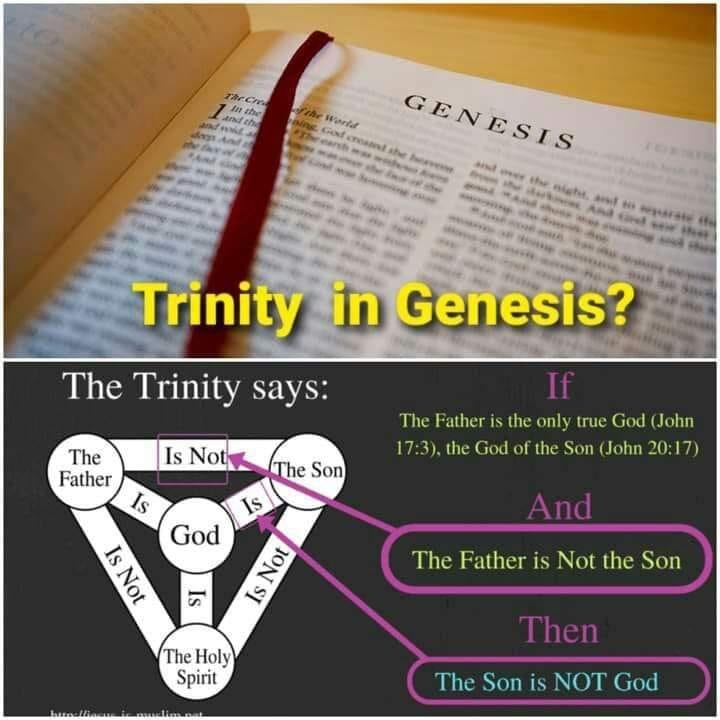
𝐂𝐡𝐫𝐢𝐬𝐭𝐢𝐚𝐧𝐬 𝐮𝐬𝐮𝐚𝐥𝐥𝐲 𝐜𝐢𝐭𝐞 𝐆𝐞𝐧𝐞𝐬𝐢𝐬 𝟏:𝟐𝟔 𝐰𝐡𝐞𝐫𝐞 𝐆𝐨𝐝 𝐮𝐬𝐞𝐝 𝐭𝐡𝐞 𝐩𝐥𝐮𝐫𝐚𝐥 𝐟𝐨𝐫𝐦 𝐰𝐡𝐞𝐧 𝐭𝐚𝐥𝐤𝐢𝐧𝐠 𝐚𝐛𝐨𝐮𝐭 𝐇𝐢𝐦𝐬𝐞𝐥𝐟:
𝐆𝐞𝐧𝐞𝐬𝐢𝐬 𝟏:𝟐𝟔 𝐀𝐧𝐝 𝐆𝐨𝐝 𝐬𝐚𝐢𝐝, 𝐥𝐞𝐭 𝐮𝐬 𝐦𝐚𝐤𝐞 𝐦𝐚𝐧 𝐢𝐧 𝐨𝐮𝐫 𝐢𝐦𝐚𝐠𝐞, 𝐚𝐟𝐭𝐞𝐫 𝐨𝐮𝐫 𝐥𝐢𝐤𝐞𝐧𝐞𝐬𝐬.
𝐀𝐜𝐭𝐮𝐚𝐥𝐥𝐲, 𝐮𝐬𝐢𝐧𝐠 𝐭𝐡𝐞 𝐩𝐥𝐮𝐫𝐚𝐥 𝐢𝐬 𝐧𝐨𝐭 𝐩𝐫𝐨𝐨𝐟 𝐭𝐡𝐚𝐭 𝐆𝐨𝐝 𝐢𝐬 𝐦𝐨𝐫𝐞 𝐭𝐡𝐚𝐧 𝐨𝐧𝐞 𝐩𝐞𝐫𝐬𝐨𝐧. 𝐓𝐡𝐢𝐬 𝐡𝐚𝐬 𝐛𝐞𝐞𝐧 𝐚 𝐥𝐚𝐧𝐠𝐮𝐚𝐠𝐞 𝐜𝐨𝐦𝐦𝐨𝐧𝐥𝐲 𝐮𝐬𝐞𝐝 𝐛𝐲 𝐤𝐢𝐧𝐠𝐬 𝐚𝐬 𝐚 𝐰𝐚𝐲 𝐨𝐟 𝐠𝐥𝐨𝐫𝐢𝐟𝐲𝐢𝐧𝐠, 𝐰𝐡𝐢𝐜𝐡 𝐰𝐚𝐬 𝐜𝐚𝐥𝐥𝐞𝐝 “𝐭𝐡𝐞 𝐫𝐨𝐲𝐚𝐥 𝐰𝐞” 𝐨𝐫 𝐦𝐚𝐣𝐞𝐬𝐭𝐢𝐜 𝐩𝐥𝐮𝐫𝐚𝐥 (𝐩𝐥𝐮𝐫𝐚𝐥𝐢𝐬 𝐦𝐚𝐣𝐞𝐬𝐭𝐚𝐭𝐢𝐬 𝐢𝐧 𝐋𝐚𝐭𝐢𝐧, 𝐥𝐢𝐭𝐞𝐫𝐚𝐥𝐥𝐲, “𝐭𝐡𝐞 𝐩𝐥𝐮𝐫𝐚𝐥 𝐨𝐟 𝐦𝐚𝐣𝐞𝐬𝐭𝐲”),
𝐰𝐡𝐢𝐜𝐡 𝐢𝐬 𝐭𝐡𝐞 𝐮𝐬𝐞 𝐨𝐟 𝐚 𝐩𝐥𝐮𝐫𝐚𝐥 𝐩𝐫𝐨𝐧𝐨𝐮𝐧 (𝐨𝐫 𝐜𝐨𝐫𝐫𝐞𝐬𝐩𝐨𝐧𝐝𝐢𝐧𝐠 𝐩𝐥𝐮𝐫𝐚𝐥-𝐢𝐧𝐟𝐥𝐞𝐜𝐭𝐞𝐝 𝐯𝐞𝐫𝐛 𝐟𝐨𝐫𝐦𝐬) 𝐭𝐨 𝐫𝐞𝐟𝐞𝐫 𝐭𝐨 𝐚 𝐬𝐢𝐧𝐠𝐥𝐞 𝐩𝐞𝐫𝐬𝐨𝐧 𝐡𝐨𝐥𝐝𝐢𝐧𝐠 𝐚 𝐡𝐢𝐠𝐡 𝐨𝐟𝐟𝐢𝐜𝐞, 𝐬𝐮𝐜𝐡 𝐚𝐬 𝐚 𝐬𝐨𝐯𝐞𝐫𝐞𝐢𝐠𝐧 (𝐞.𝐠., 𝐚 𝐦𝐨𝐧𝐚𝐫𝐜𝐡) 𝐨𝐫 𝐫𝐞𝐥𝐢𝐠𝐢𝐨𝐮𝐬 𝐥𝐞𝐚𝐝𝐞𝐫 (𝐞.𝐠., 𝐭𝐡𝐞 𝐏𝐨𝐩𝐞). 𝐍𝐨 𝐨𝐧𝐞 𝐬𝐚𝐢𝐝 𝐭𝐡𝐚𝐭 𝐭𝐡𝐞𝐬𝐞 𝐤𝐢𝐧𝐠𝐬 𝐨𝐫 𝐩𝐨𝐩𝐞𝐬 𝐰𝐡𝐨 𝐮𝐬𝐞𝐝 𝐭𝐡𝐢𝐬 𝐟𝐨𝐫𝐦 𝐰𝐞𝐫𝐞 𝟑 𝐩𝐞𝐫𝐬𝐨𝐧𝐬 𝐢𝐧 𝐨𝐧𝐞 𝐡𝐮𝐦𝐚𝐧 𝐛𝐞𝐢𝐧𝐠. 𝐇𝐨𝐰𝐞𝐯𝐞𝐫, 𝐢𝐭 𝐰𝐚𝐬 𝐮𝐧𝐝𝐞𝐫𝐬𝐭𝐨𝐨𝐝 𝐭𝐡𝐚𝐭 𝐢𝐭 𝐰𝐚𝐬 𝐣𝐮𝐬𝐭 𝐟𝐨𝐫 𝐠𝐥𝐨𝐫𝐢𝐟𝐢𝐜𝐚𝐭𝐢𝐨𝐧.
𝐓𝐡𝐞 𝐬𝐚𝐦𝐞 𝐭𝐡𝐢𝐧𝐠 𝐚𝐩𝐩𝐥𝐢𝐞𝐬 𝐡𝐞𝐫𝐞 𝐭𝐨 𝐆𝐨𝐝 𝐢𝐧 𝐆𝐞𝐧𝐞𝐬𝐢𝐬 𝟏:𝟐𝟕 𝐚𝐧𝐝 𝐭𝐡𝐞 𝐧𝐞𝐱𝐭 𝐯𝐞𝐫𝐬𝐞 𝐩𝐫𝐨𝐯𝐞𝐬 𝐭𝐡𝐚𝐭 𝐢𝐭 𝐢𝐬 𝐣𝐮𝐬𝐭 𝐫𝐞𝐥𝐚𝐭𝐞𝐝 𝐭𝐨 𝐠𝐥𝐨𝐫𝐢𝐟𝐢𝐜𝐚𝐭𝐢𝐨𝐧 𝐧𝐨𝐭 𝐭𝐨 𝐭𝐡𝐫𝐞𝐞 𝐩𝐡𝐲𝐬𝐢𝐜𝐚𝐥 𝐩𝐞𝐫𝐬𝐨𝐧𝐬:
𝐆𝐞𝐧𝐞𝐬𝐢𝐬 𝟏:𝟐𝟕 𝐀𝐧𝐝 𝐆𝐨𝐝 𝐜𝐫𝐞𝐚𝐭𝐞𝐝 𝐦𝐚𝐧 𝐢𝐧 𝐡𝐢𝐬 𝐨𝐰𝐧 𝐢𝐦𝐚𝐠𝐞, 𝐢𝐧 𝐭𝐡𝐞 𝐢𝐦𝐚𝐠𝐞 𝐨𝐟 𝐆𝐨𝐝 𝐜𝐫𝐞𝐚𝐭𝐞𝐝 𝐡𝐞 𝐡𝐢𝐦; 𝐦𝐚𝐥𝐞 𝐚𝐧𝐝 𝐟𝐞𝐦𝐚𝐥𝐞 𝐜𝐫𝐞𝐚𝐭𝐞𝐝 𝐡𝐞 𝐭𝐡𝐞𝐦.
𝐈𝐟 𝐆𝐞𝐧𝐞𝐬𝐢𝐬 𝟏:𝟐𝟔 𝐫𝐞𝐚𝐥𝐥𝐲 𝐦𝐞𝐚𝐧𝐬 𝐭𝐡𝐞 𝐭𝐫𝐢𝐧𝐢𝐭𝐲, 𝐆𝐞𝐧𝐞𝐬𝐢𝐬 𝟏:𝟐𝟕 𝐰𝐨𝐮𝐥𝐝 𝐡𝐚𝐯𝐞 𝐛𝐞𝐞𝐧 𝐥𝐢𝐤𝐞 𝐭𝐡𝐚𝐭: “𝐀𝐧𝐝 𝐆𝐨𝐝 𝐜𝐫𝐞𝐚𝐭𝐞𝐝 𝐦𝐚𝐧 𝐢𝐧 𝐭𝐡𝐞𝐢𝐫 𝐨𝐰𝐧 𝐢𝐦𝐚𝐠𝐞” 𝐟𝐨𝐫 𝐭𝐡𝐞 𝐯𝐞𝐫𝐬𝐞𝐬 𝐭𝐨 𝐛𝐞 𝐜𝐨𝐧𝐬𝐢𝐬𝐭𝐞𝐧𝐭.
𝐎𝐭𝐡𝐞𝐫𝐰𝐢𝐬𝐞, 𝐭𝐡𝐢𝐬 𝐩𝐫𝐨𝐯𝐞𝐬 𝐭𝐡𝐚𝐭 𝐭𝐡𝐞 𝐟𝐨𝐫𝐦𝐞𝐫 𝐯𝐞𝐫𝐬𝐞 𝐰𝐚𝐬 𝐣𝐮𝐬𝐭 𝐮𝐬𝐞𝐝 𝐟𝐨𝐫 𝐠𝐥𝐨𝐫𝐢𝐟𝐲𝐢𝐧𝐠, 𝐨𝐭𝐡𝐞𝐫𝐰𝐢𝐬𝐞, 𝐭𝐡𝐢𝐬 𝐰𝐢𝐥𝐥 𝐦𝐞𝐚𝐧 𝐭𝐡𝐚𝐭 𝐭𝐡𝐞 𝐨𝐭𝐡𝐞𝐫 𝐭𝐰𝐨 𝐩𝐞𝐫𝐬𝐨𝐧𝐬 𝐰𝐞𝐧𝐭 𝐚𝐰𝐚𝐲, 𝐚𝐧𝐝 𝐨𝐧𝐥𝐲 𝐨𝐧𝐞 𝐩𝐞𝐫𝐬𝐨𝐧 𝐫𝐞𝐦𝐚𝐢𝐧𝐞𝐝 𝐨𝐟 𝐰𝐡𝐨𝐦 𝐦𝐚𝐧 𝐰𝐚𝐬 𝐜𝐫𝐞𝐚𝐭𝐞𝐝 𝐨𝐧 𝐡𝐢𝐬 𝐢𝐦𝐚𝐠𝐞.
𝐀𝐥𝐬𝐨 𝐮𝐬𝐢𝐧𝐠 𝐭𝐡𝐞 𝐰𝐨𝐫𝐝 𝐄𝐥𝐨𝐡𝐢𝐦 𝐟𝐨𝐫 𝐆𝐨𝐝 𝐰𝐡𝐢𝐜𝐡 𝐢𝐬 𝐚 𝐩𝐥𝐮𝐫𝐚𝐥 𝐟𝐨𝐫𝐦 𝐢𝐧 𝐇𝐞𝐛𝐫𝐞𝐰 𝐢𝐬 𝐜𝐨𝐦𝐦𝐨𝐧𝐥𝐲 𝐜𝐢𝐭𝐞𝐝 𝐛𝐲 𝐂𝐡𝐫𝐢𝐬𝐭𝐢𝐚𝐧𝐬 𝐭𝐨 𝐩𝐫𝐨𝐯𝐞 𝐭𝐡𝐚𝐭. 𝐇𝐨𝐰𝐞𝐯𝐞𝐫, 𝐢𝐟 𝐭𝐡𝐢𝐬 𝐢𝐬 𝐜𝐨𝐧𝐬𝐢𝐝𝐞𝐫𝐞𝐝 𝐭𝐨 𝐛𝐞 𝐩𝐫𝐨𝐨𝐟 𝐟𝐨𝐫 𝐭𝐡𝐞 𝐭𝐫𝐢𝐧𝐢𝐭𝐲, 𝐭𝐡𝐞𝐧 𝐰𝐞 𝐰𝐨𝐮𝐥𝐝 𝐬𝐚𝐲 𝐭𝐡𝐚𝐭 𝐌𝐨𝐬𝐞𝐬 𝐚𝐬 𝐰𝐞𝐥𝐥 𝐢𝐬 𝐚 𝐭𝐫𝐢𝐧𝐢𝐭𝐲 𝐚𝐬 𝐄𝐱𝐨𝐝𝐮𝐬 𝟕:𝟏 𝐮𝐬𝐞𝐬 𝐭𝐡𝐞 𝐰𝐨𝐫𝐝 𝐄𝐥𝐨𝐡𝐢𝐦 𝐰𝐡𝐞𝐧 𝐢𝐭 𝐬𝐚𝐲𝐬 𝐭𝐡𝐚𝐭 𝐌𝐨𝐬𝐞𝐬 𝐢𝐬 𝐚 𝐠𝐨𝐝 𝐭𝐨 𝐭𝐡𝐞 𝐏𝐡𝐚𝐫𝐨𝐚𝐡:
𝐄𝐱𝐨𝐝𝐮𝐬 𝟕:𝟏 𝐀𝐧𝐝 𝐭𝐡𝐞 𝐋𝐎𝐑𝐃 𝐬𝐚𝐢𝐝 𝐭𝐨 𝐌𝐨𝐬𝐞𝐬, 𝐒𝐞𝐞, 𝐈 𝐡𝐚𝐯𝐞 𝐦𝐚𝐝𝐞 𝐲𝐨𝐮 𝐚 𝐠𝐨𝐝 (𝐄𝐥𝐨𝐡𝐢𝐦) 𝐭𝐨 𝐏𝐡𝐚𝐫𝐚𝐨𝐡: 𝐚𝐧𝐝 𝐀𝐚𝐫𝐨𝐧 𝐲𝐨𝐮𝐫 𝐛𝐫𝐨𝐭𝐡𝐞𝐫 𝐬𝐡𝐚𝐥𝐥 𝐛𝐞 𝐲𝐨𝐮𝐫 𝐩𝐫𝐨𝐩𝐡𝐞𝐭.
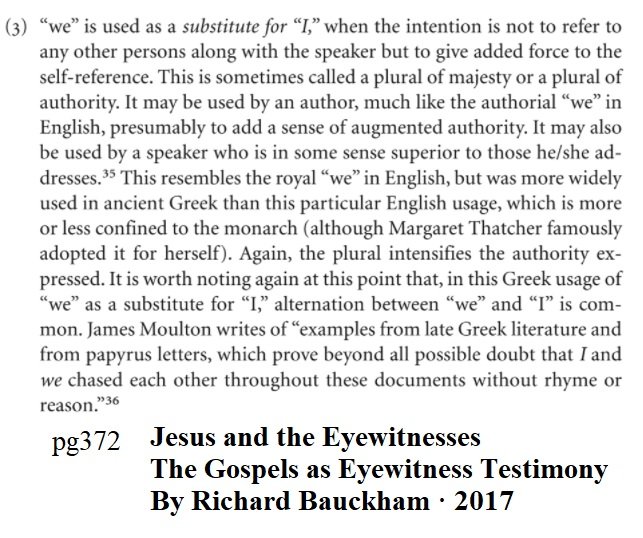
𝐈𝐧 𝐜𝐚𝐬𝐞 𝐭𝐡𝐞 𝐂𝐡𝐫𝐢𝐬𝐭𝐢𝐚𝐧𝐬 𝐚𝐭𝐭𝐚𝐜𝐤 𝐈𝐬𝐥𝐚𝐦 𝐚𝐛𝐨𝐮𝐭 𝐭𝐡𝐞 “𝐑𝐨𝐲𝐚𝐥 𝐖𝐞” (𝐖𝐞, 𝐔𝐬, 𝐎𝐮𝐫) 𝐢𝐧 𝐓𝐡𝐞 𝐆𝐥𝐨𝐫𝐢𝐨𝐮𝐬 𝐇𝐨𝐥𝐲 𝐐𝐮𝐫𝐚𝐧. 𝐑𝐨𝐲𝐚𝐥 𝐖𝐞 (𝐌𝐚𝐣𝐞𝐬𝐭𝐢𝐜 𝐏𝐥𝐮𝐫𝐚𝐥) 𝐚𝐥𝐬𝐨 𝐞𝐱𝐢𝐬𝐭 𝐢𝐧 𝐭𝐡𝐞𝐢𝐫 𝐁𝐢𝐛𝐥𝐞.
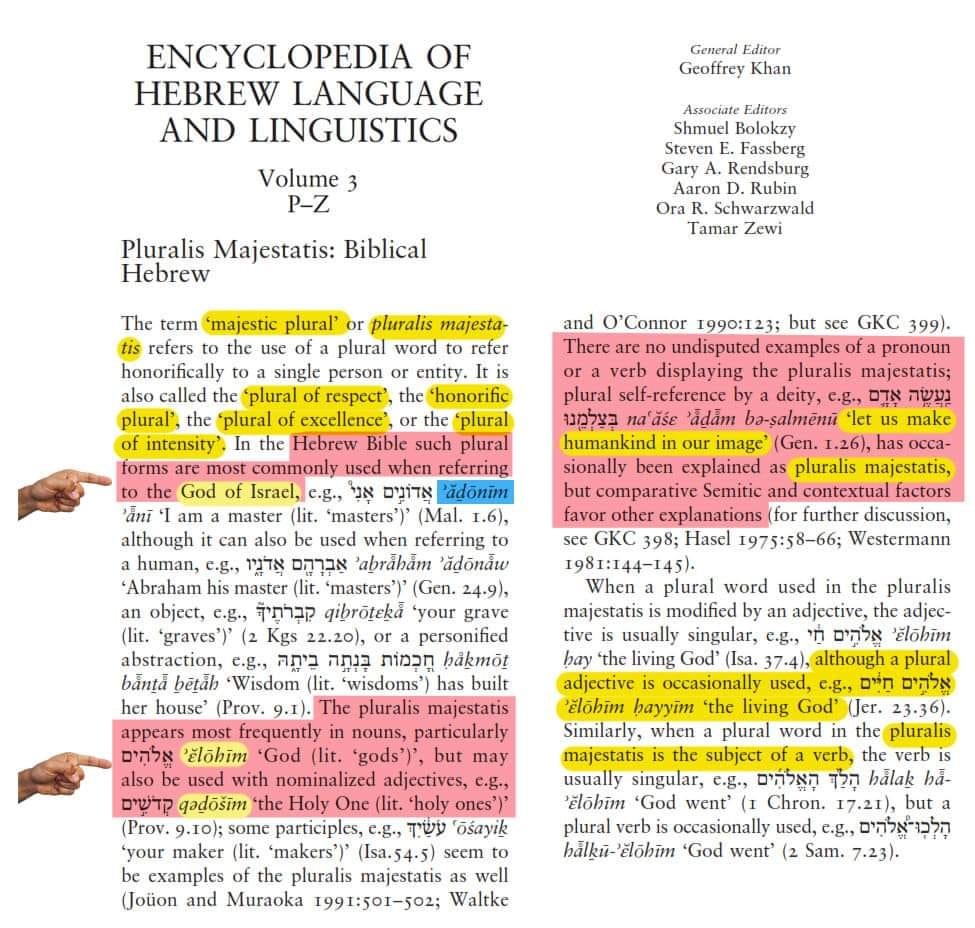
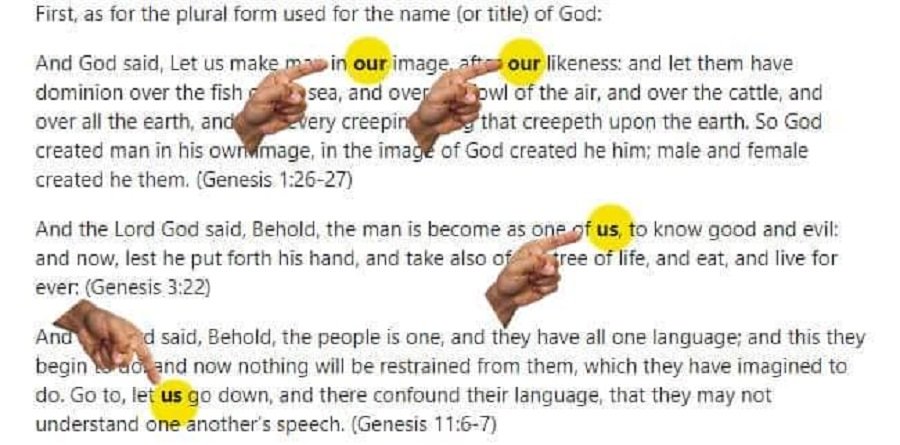
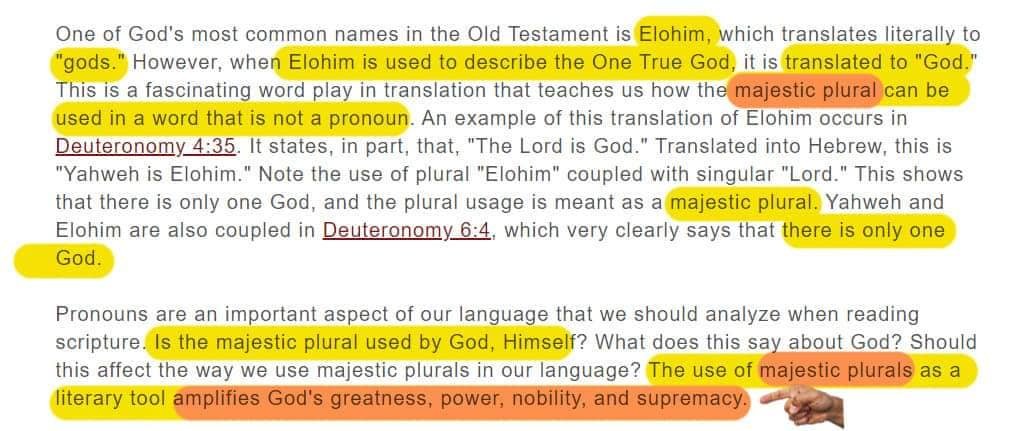

𝐀𝐥𝐥𝐚𝐡 𝐊𝐧𝐨𝐰𝐬 𝐁𝐞𝐬𝐭.
𝐑𝐞𝐟𝐞𝐫𝐞𝐧𝐜𝐞𝐬:
Why Do We Refer to God Using the Masculine Pronoun?
Why Quran uses masculine pronouns (He/Him/His) for Allah?
The Concept of “We” as used in The Qur’an by Allah
The use of the plural “We” by God in the Quran- The Majestic We